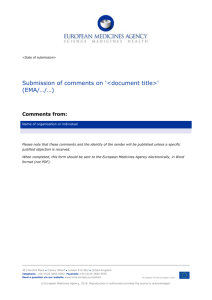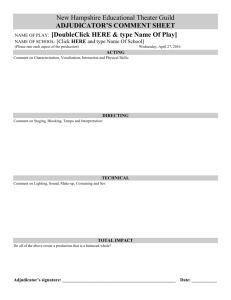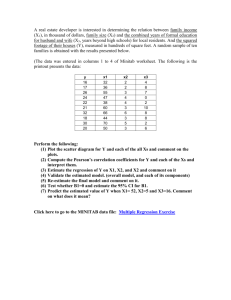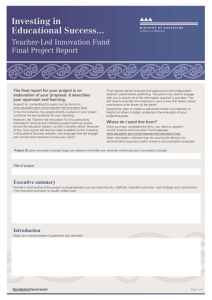Ireland
advertisement
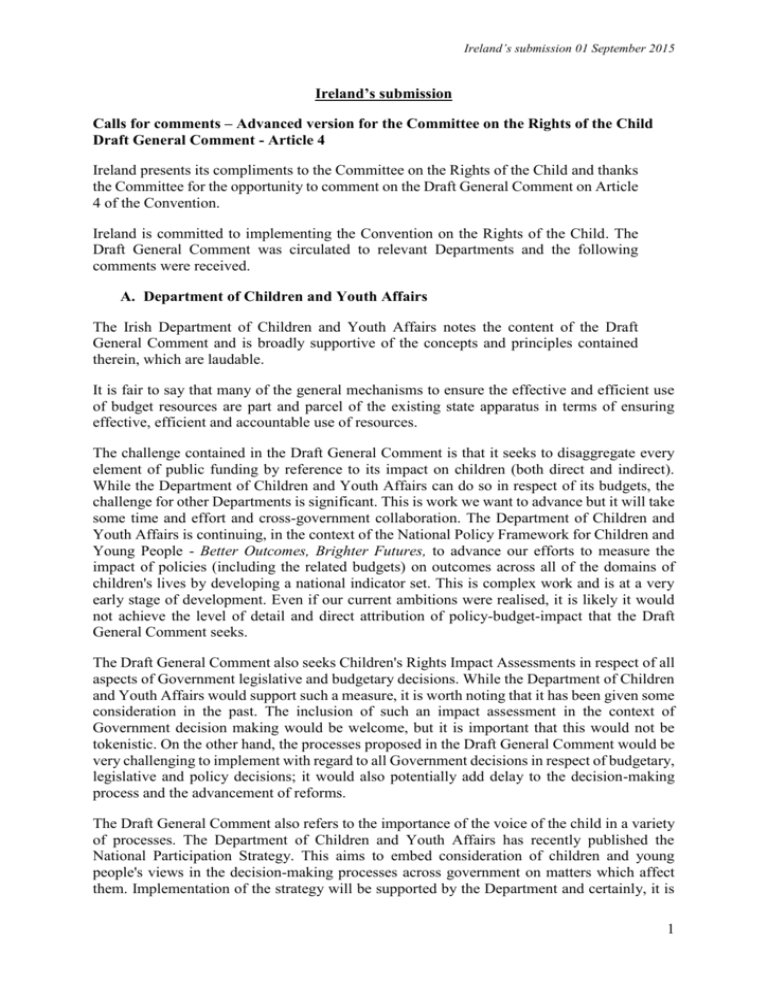
Ireland’s submission 01 September 2015 Ireland’s submission Calls for comments – Advanced version for the Committee on the Rights of the Child Draft General Comment - Article 4 Ireland presents its compliments to the Committee on the Rights of the Child and thanks the Committee for the opportunity to comment on the Draft General Comment on Article 4 of the Convention. Ireland is committed to implementing the Convention on the Rights of the Child. The Draft General Comment was circulated to relevant Departments and the following comments were received. A. Department of Children and Youth Affairs The Irish Department of Children and Youth Affairs notes the content of the Draft General Comment and is broadly supportive of the concepts and principles contained therein, which are laudable. It is fair to say that many of the general mechanisms to ensure the effective and efficient use of budget resources are part and parcel of the existing state apparatus in terms of ensuring effective, efficient and accountable use of resources. The challenge contained in the Draft General Comment is that it seeks to disaggregate every element of public funding by reference to its impact on children (both direct and indirect). While the Department of Children and Youth Affairs can do so in respect of its budgets, the challenge for other Departments is significant. This is work we want to advance but it will take some time and effort and cross-government collaboration. The Department of Children and Youth Affairs is continuing, in the context of the National Policy Framework for Children and Young People - Better Outcomes, Brighter Futures, to advance our efforts to measure the impact of policies (including the related budgets) on outcomes across all of the domains of children's lives by developing a national indicator set. This is complex work and is at a very early stage of development. Even if our current ambitions were realised, it is likely it would not achieve the level of detail and direct attribution of policy-budget-impact that the Draft General Comment seeks. The Draft General Comment also seeks Children's Rights Impact Assessments in respect of all aspects of Government legislative and budgetary decisions. While the Department of Children and Youth Affairs would support such a measure, it is worth noting that it has been given some consideration in the past. The inclusion of such an impact assessment in the context of Government decision making would be welcome, but it is important that this would not be tokenistic. On the other hand, the processes proposed in the Draft General Comment would be very challenging to implement with regard to all Government decisions in respect of budgetary, legislative and policy decisions; it would also potentially add delay to the decision-making process and the advancement of reforms. The Draft General Comment also refers to the importance of the voice of the child in a variety of processes. The Department of Children and Youth Affairs has recently published the National Participation Strategy. This aims to embed consideration of children and young people's views in the decision-making processes across government on matters which affect them. Implementation of the strategy will be supported by the Department and certainly, it is 1 Ireland’s submission 01 September 2015 intended that this will strengthen the skill set across Departments so that decision-making processes and the involvement of children and young people becomes a standard approach when consulting in policy-making. Nevertheless, this may well fall short of the widespread and regular involvement of children and young people in all decision-making including budgetary decision-making envisaged in the Draft General Comment. Other Departments will have a view on how realistic this approach is beyond commitments already made in the National Participation Strategy. Most centrally is the suggestion that spending on children be prioritised in the context of budgetary discussions. As the Department of Children and Youth Affairs, clearly the Department could only support such an approach and part of our mandate is to make the case that children's services and changes in laws and policies required to support their rights are prioritised. The Department's central role as the co-ordinator of cross-Government action on children is clear. Through the mechanisms of Better Outcomes, Brighter Futures we continue to support our colleagues across Government to consider their commitments to children as a priority. However, it is clear to us that the consideration of public spending solely in relation to the rights of the child presents many challenges in respect of resource allocation and policy formation. National commitments in respect of expenditure and resource allocation cannot be made on the basis of consideration of a single issue only, and risks overlooking complementary interests (e.g. family income supports, labour market activation measures, health services for adults all of which benefit and provide protective factors to, children). The Department acknowledges that it is essential that a balance be struck between competing but equally important demands on finite resources. B. Department of Social Protection The Irish Department of Social Protection represents a model of good practice in regard to public spending and the rights of the child. Some examples follow: • There are a number of expenditure programmes relating to children, amounting to almost €3 billion in expenditure per annum. These include Child Benefit: a payment for all children; targeted child payments linked to specific contingencies such as low paid employment (Family Income Supplement); or welfare dependency of parents (qualified child increases). The Department also has a targeted payment linked to school participation such as the Back to School Clothing and Footwear Allowance. In addition, there are income support schemes for Guardians of orphans. • The Department uses outcome indicators to assess the needs of children and to measure policy impact, such as income poverty and consistent poverty. • Data on the beneficiaries of children’s programmes are reported in the Department’s annual statistical report. • The Department undertakes extensive consultation with children’s groups in relation to its expenditure, including individual meetings with the Minister, the annual pre-Budget Forum, and specific policy reviews, for example, the Advisory Group on Tax and Social Welfare. • The Department includes ‘child impact assessment’ as a component of an annual social impact assessment of the Budget. 2 Ireland’s submission 01 September 2015 • The Department undertakes periodic reviews of the value for money and effectiveness of its child expenditure programmes. 3
